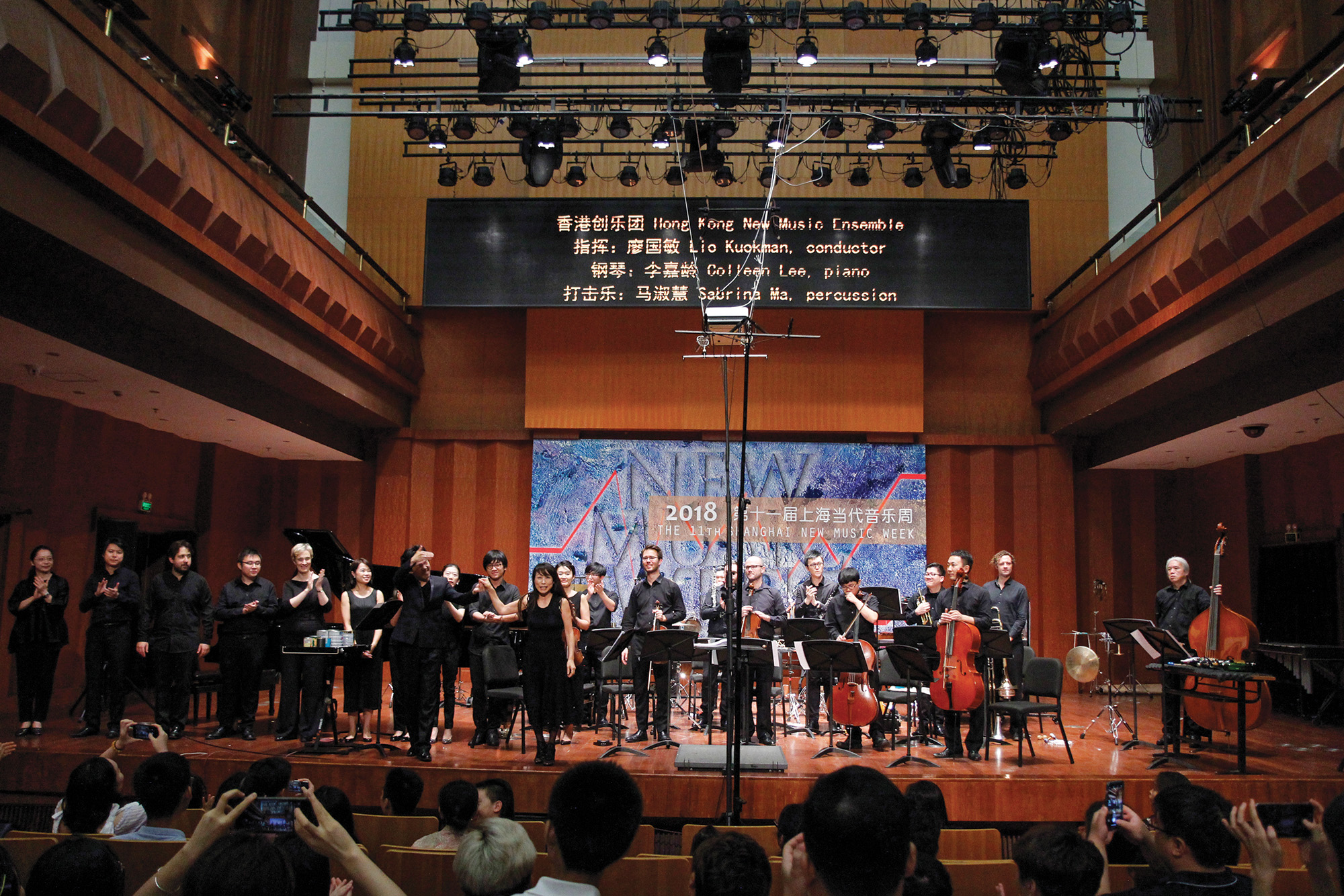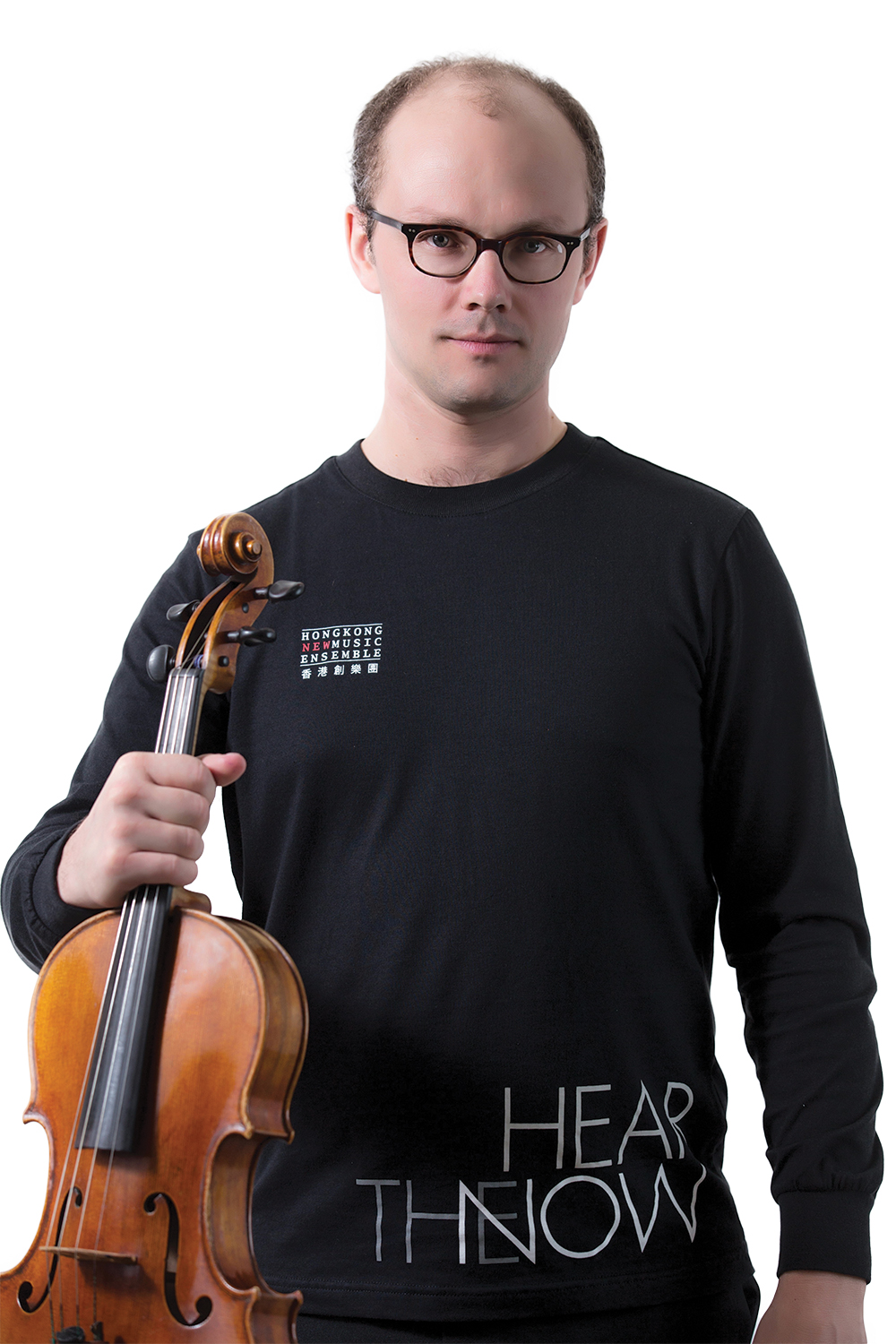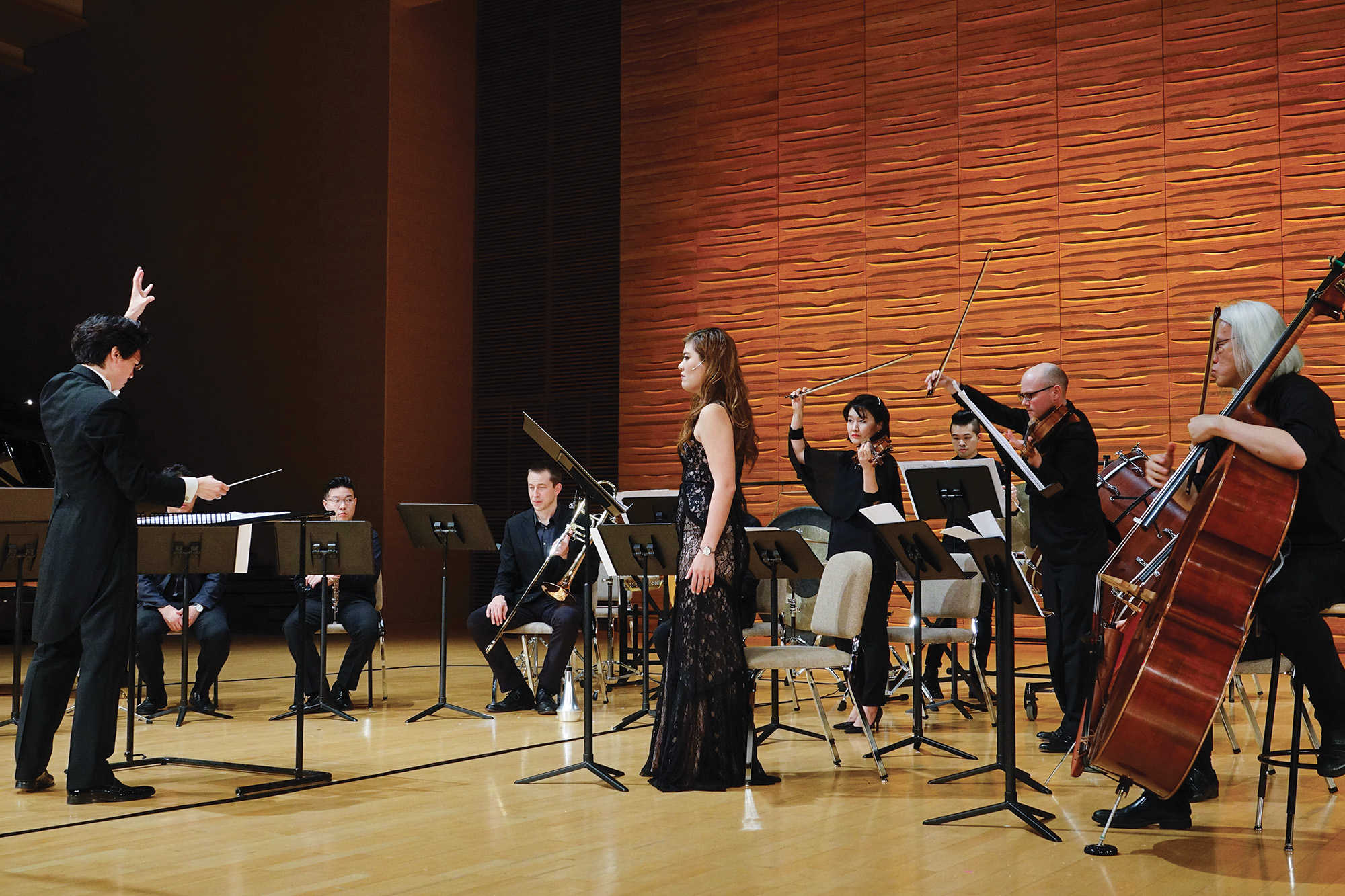Vantage Music | July 2020| Hong Kong
Recently, Vantage Music was fortunate to be able to have an interview with William Lane, Founder and Artistic Director of the Hong Kong New Music Ensemble to know something more about him and his latest endeavours.

Unsuk Chin Portrait Concert, Shanghai New Music Week 2018 (He Luting Concert Hall, Shanghai Conservatory of Music)
There are a number of teachers mentioned in your biography: Jan Sedivka, Bruno Giuranna and Garth Knox. Could you please tell us more about how you came to study with these teachers? What are the things they taught you that still stay with you today? What were their teaching like?
I studied with Jan Sedivka (1917-2009), who was regarded as one of Australia’s foremost string pedagogues, at the Tasmanian Conservatorium of Music in Australia from 2001 to 2004. Sedivka was endlessly curious, and great at stimulating students’ interests on a personal level. He taught me countless ways of playing a single phrase, combined with rigorous exercises to complement left hand technique. He did, after all, study with Otakar Ševčík (1852 –1934), the great Czech violinist who authored important (and sometimes detested!) violin studies. He was also an amazing commissioner of new compositions, so he encouraged me to pursue this path as well.
In 2004 I moved to Italy to study for two years with Bruno Giuranna. I initially came to know him through his recordings and adored his sound. His pedagogical approach was at times the polar opposite to that of Sedivka. We never had one-to-one lessons, but always in a group class setting. Books of his fingerings of the repertoire were always at hand in the classroom. Many of his editions I continue to use and pass on to my students today.
During my times of study in Italy, I regularly travelled across to Paris to study with Garth Knox, one of my musical icons and probably the world’s foremost contemporary music specialist on the viola. For repertoire like Berio, Sciarrino, Scelsi and Grisey, there was literally no one else who could teach it and perform it like him!
What was your experience training/ studying at the International Ensemble Modern Academy in Germany?
The IEMA in Frankfurt is an intensive and super small contemporary chamber music course, under the supervision of Ensemble Modern musicians. At the same time I was working freelance with Ensemble Modern, probably Germany’s best new music group, and this was a perfect combination.
You were a prizewinner of the Valentino Bucchi Competition in Rome in 2005 – Can you tell us something about this competition, e.g. what did you go through, what pieces did you play, and what prize you received?
Honestly, I just remember meeting new friends and eating good Italian food in Rome! But I did happen to win the 3rd Prize and the Spada Special Prize for interpretation. This is one of the only prizes in Italy dedicated to contemporary music interpretation.
Could you please tell us more about Ensemble Resonanz and Ensemble Modern? E.g. when they were formed, who are the members, what had been achieved and any future plans to share with us?
Ensemble Modern is one of the most established new music groups in Germany. Ensemble Resonanz is a string group specialising in both early music and contemporary music. HKNME has brought Ensemble Resonanz to Hong Kong twice now! The first time they came, they taught at the Modern Academy (the educational arm the HKNME used to run), and upcoming we will have a big international coproduction with them, which will be presented in Hong Kong and Germany in 2021-22.
You’ve been based in HK since 2008, how did you make that decision?
There wasn’t a new music ensemble here, so I formed one. I loved the city and its fervent and non-stop energy. I also felt that there was a good potential audience here for experimental music, after a regional tour to southern China just before the 2008 Olympics. I was looking for a place with government support of the arts, and with an open-minded and curious audience base.
HKNME’s website mentioned Opera Collaborations – would you like to share with us what those are about?
The Hong Kong New Music Ensemble has been involved in many contemporary operas over the past years. We toured in New York City and San Francisco last December for the last one that we were involved in called “Mila”. We were involved in the opera from almost the very beginning of its creation. Commissioned by Asia Society Hong Kong Center, the opera sheds light on Hong Kong’s pressure-cooker social environment, examining the territory’s tensions in a 70-minute intersection of home life and the workplace. Sung in Cantonese, English, and Tagalog, “Mila” explores the challenges and relationships within a Hong Kong family: an American husband, his Hong Kong wife and their son, and their domestic helper Mila from the Philippines.
It seems that the Modern Academy is focusing on education outreach and research projects? What are these projects?
The Modern Academy ran from 2014 to 2018, bringing together young musicians and composers from the region, and working together with esteemed international artists.
How did new music inspire you to do what you are doing?
New music is both my muse and worst enemy. But I do love interacting with living composers and this gives me inspiration to continue to make music.
COVID-19 has affected music/concert performance but has that somehow altered the way you will do these in the future?
Indeed, COVID-19 has affected everything in the Hong Kong New Music Ensemble’s short-term planning. In 2019, 80% of the HKNME’s productions focused on international and domestic touring (to Taiwan, Korea, Macau, USA, Thailand and Mainland China). Earlier this year we had to cancel or postpone concert appearances in New York City and Taipei because of COVID. So for our 2020-21 season we need to re-focus and “localise” our output. Since several of our members live overseas and a lot of guest international artists cannot reach us, we have had to adjust our musician line-ups and programmes. Moving forward, we are focusing on recording projects, online engagement initiatives and our local concert series.

William Lane. (Photo credit: Moon 9 Image.)
What are the future projects in mind, just generally speaking, if any?
So many! I’m particularly excited about “Caravanserais”, our practice-based research platform 2019-2021. A meeting place for exchange of cultures and interaction among artistic disciplines, this initiative is about engaging musicians and artists from various geographical locations and media, and will establish a practical methodology to mediate between musical practice and aesthetic reflection. Starting in 2019, a team of composers, musicians, artists, scholars and curators have been convening in Hong Kong to collaborate, experiment, research and observe—by organising practical workshops, seminars and conferences—with the aim of developing creative outputs that explore the meaning of artistic productions in our time.
We also have a Beethoven 2020 tribute in collaboration with Goethe Institut Hong Kong—soon to be announced!
Say if we do have a next life after the present one, would you choose to do what you’re doing again?
Perhaps I’d be a farmer, just like my ancestors in Tasmania.
Early Childhood – why did you pick your instrument, and could you describe what was the experience like?
I asked to play the violin when I was seven. At fourteen I changed to the viola after hearing my new teacher Rodney McDonald, a professional violist in our local orchestra, play it for me. I was immediately enamored by its dark sonority.
Were you good at other academic subjects at school?
I guess so. I particularly loved Geography, History and Literature.
What was the style of discipline that you received from your parents and teachers in terms of praise and punishment on music learning/ practice as a child?
I was always encouraged, never pressured.
How did you come about setting music as your career and what (or who) gave you the motivation for that?
I wanted to be a professional musician ever since I was seven years old.
Being a performing artist, practice is a big part which comes with great sacrifices. We know of many musicians who receded to more or less full-time teachers, or who changed careers altogether. What keeps you from doing this? What do you find most challenging as a violist and artistic director?
As well as being a performing artist, I am also a teacher, arts administrator and business owner. During this COVID-19 lockdown period I’m actually very busy with my two businesses in Happy Valley: Ekologic, an eco lifestyle/ zero waste store; and Happy Music Academy, a music tuition centre. I sincerely believe that musicians in the 21st century need to be multi-faceted, and hopefully these different hats can make us become better people equipped for a range of challenges in life.
In your opinion, what is your most favourite piece and the most challenging piece? Why?
I have a different favourite piece every single day! In terms of the most challenging piece I’ve ever played, it would have to be Portuguese composer Emanuel Nunes’ Improvisation 2-Portrait, for solo viola. Every single string of the viola is notated so precisely, and it is a real workout for the entire body. Just like Berio’s Sequenza VI, you should visit the gym before attempting it!
Can you recall your very first serious public performance—what was it like?
I was scared shitless. Hopefully it wasn’t recorded!
Which composer / era/ genres of music do you like the most?
Again, it changes day-by-day. At the moment I’m listening to Cuban jazz. I spent a week walking almost 100km around the streets of Havana several years ago. During this time of restricted global mobility, we must travel in our minds through our playlists!
Is there a particular role model for you? If so, who is he/she? Is it an individual or a group? Or how about someone who had the greatest influence on you?
Some I have met, some I meet in books, and many are in my family.
What is the most embarrassing moment for you? The most bizarre thing live on stage? How did you react?
Many embarrassing moments! Before my first youth orchestra concert in Tasmania, I left my glasses at home, so I had to sit at the back of the section by myself squinting at the notes. There have been other embarrassing moments, but usually I try to forget them and move on!

HKNME Season Closing Concert 2018 (HKAPA Amphitheatre). (Photo credit: Moon 9 Image.)
Do you listen to music recordings and/or go to concerts?
I always listen to music. I’ve been enjoying particularly a lot of COVID livestreams online. I do enjoy live music too, but I’m very selective about what I go to. I am well-known for walking out of concerts after I’ve heard the piece I came for (rather than staying for an umpteenth performance of this-and-that over-performed Romantic symphony).
Did you get inspired from interacting with the young students/ musicians?
Absolutely! I currently have students from five years old to university age. I have to say that as a new father myself, I’m enjoying teaching my younger students more and more. It’s so hard to engage their interest to instill in them a lifelong love of music, and I’m enjoying that challenge.
Given your experience in your career thus far, if you have something you would like to tell the students, what would that be?
“He who does not penetrate to the interior, to the heart of sound, even though a perfect craftsman, a great technician, will never be a true artist, a true musician.” – Giacinto Scelsi (1905-1988)
Certainly, everyone can have down days in performance/ practice—I would say even more so for musicians as the career nature is very emotional—how did you get over that? Any advice for students?
My advice is that sometimes we must overcome lethargy with effort; at other times we must accept that it’s best to leave it be. Don’t let the choice drive you nuts, just use good judgement and deal with it the best you can. We’re all human.
What is your impression on the current generation of music students, e.g. their attitudes, styles etc? Anything they are lacking and that you’d like them to improve/ focus on?
Listen, read and watch as much as you can, plus:
“Be patient toward all that is unsolved in your heart and try to love the questions themselves. Do not now seek the answers, which cannot be given you because you would not be able to live them. And the point is to live everything. Live the questions.” – Rainer Maria Rilke (1875-1926)

